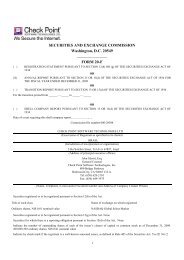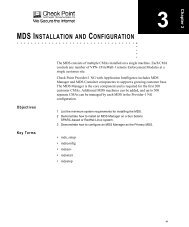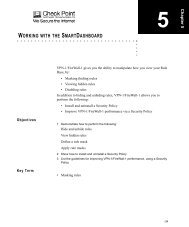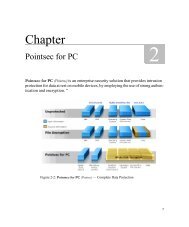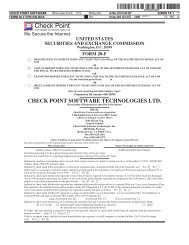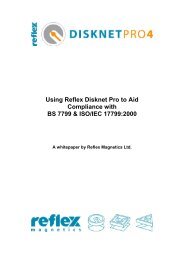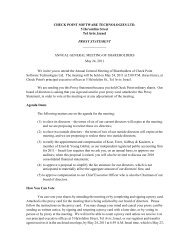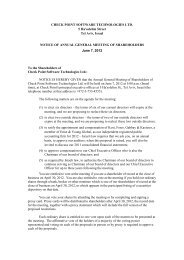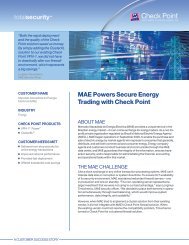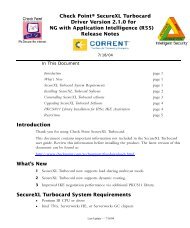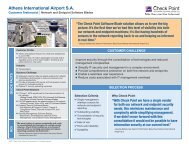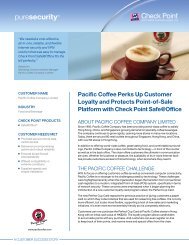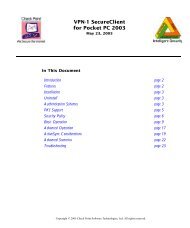FORM 20-F - Check Point
FORM 20-F - Check Point
FORM 20-F - Check Point
You also want an ePaper? Increase the reach of your titles
YUMPU automatically turns print PDFs into web optimized ePapers that Google loves.
� upon expiration of a particular benefit, we may not be eligible to participate in a new program or<br />
qualify for a new tax benefit that would offset the loss of the expiring tax benefit, or<br />
� we may be required to refund previously recognized tax benefits if we are found to be in violation of<br />
the stipulated conditions.<br />
Additional details are provided in “Item 5 – Operating and Financial Review and Products” under the<br />
caption “Taxes on income”, in “Item 10 – Additional Information” under the caption “Israeli taxation, foreign<br />
exchange regulation and investment programs”, and in notes 9 and 10 to our consolidated financial statements.<br />
Our operations may be disrupted by the obligations of our personnel to perform military service<br />
Many of our employees in Israel, including members of senior management, are obligated to perform one<br />
month (in some cases, more or less) of annual military reserve duty until they reach age 45 and, in the event of a<br />
military conflict, could be called to active duty. Our operations could be disrupted by the absence of a significant<br />
number of our employees related to military service or the absence for extended periods of military service of one<br />
or more of our key employees. Military service requirements for our employees could materially adversely affect<br />
our business, operating results and financial condition.<br />
Provisions of Israeli law and our articles of association may delay, prevent or make difficult an acquisition of us,<br />
prevent a change of control, and negatively impact our share price<br />
Israeli corporate law regulates acquisitions of shares through tender offers and mergers, requires special<br />
approvals for transactions involving directors, officers or significant shareholders, and regulates other matters that<br />
may be relevant to these types of transactions. Furthermore, Israeli tax considerations may make potential<br />
acquisition transactions unappealing to us or to some of our shareholders. For example, Israeli tax law may<br />
subject a shareholder who exchanges his or her ordinary shares for shares in a foreign corporation to taxation<br />
before disposition of the investment in the foreign corporation. These provisions of Israeli law may delay, prevent<br />
or make difficult an acquisition of our company, which could prevent a change of control and therefore, depress<br />
the price of our shares.<br />
In addition, our articles of association contain certain provisions that may make it more difficult to<br />
acquire us, such as the provision which provides that our board of directors may issue preferred shares. These<br />
provisions may have the effect of delaying or deterring a change in control of us, thereby limiting the opportunity<br />
for shareholders to receive a premium for their shares and possibly affecting the price that some investors are<br />
willing to pay for our securities.<br />
Additional details are provided in “Item 10 – Additional Information” under the caption “Articles of<br />
association and Israeli Companies Law – Anti-takeover measures.”<br />
Our operations expose us to risks associated with fluctuations in foreign currency exchange rates that could<br />
adversely affect our business.<br />
Although we have operations throughout the world, the majority of our revenue and approximately 65%<br />
of our operating costs in <strong>20</strong>07 were denominated in, or linked to, the U.S. dollar. Accordingly, we consider the<br />
U.S. dollar to be our functional currency. However, approximately 35% of our operating costs in fiscal <strong>20</strong>07 were<br />
incurred outside the United States in other currencies, particularly in Israeli Shekels and Swedish Kronas.<br />
Therefore, fluctuations in exchange rates between the currencies in which such costs are incurred and the dollar<br />
may have a material adverse effect on our results of operations and financial condition. For example, during <strong>20</strong>07,<br />
the Israel Shekel appreciated against the U.S. dollar, which resulted in a significant increase in the U.S. dollar cost<br />
18



